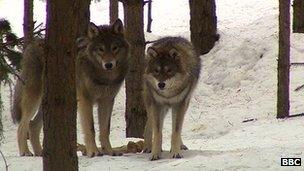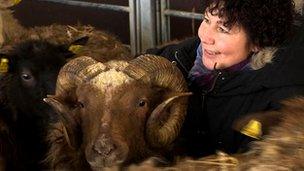Sweden wolf cull divides wilderness opinion
- Published
Wolf hunter Hakan Svartvik: "It's good for hunters and good for the wolves."
Sweden has suspended a controversial cull of its wolf population shortly after it began because of a legal challenge by conservationists. Three of the 16 wolves allowed under the quota were killed before the hunt was called off.
It was still snowing when they set off, long before sunrise. The band of hunters spread out, driving along the silent forest roads.
When Hakan Svartvik saw animal tracks in the fresh snow, he stopped and followed them on foot. The wolf pack had moved through here, quite recently. It was close.
"They have been here during the last two hours," he said a short hike later. The snow was stained blood red.
Nearby lay a dead female elk, its stomach ripped open - an early-morning feast for the wolves.
Each hunter phoned in his information. Back at base in his kitchen, Ronny Styffe was building up a picture of where the wolf pack had moved overnight.
He now knew enough to send in the hunters, to encircle the pack. It was time to get going.
They pulled on camouflage snow trousers and jackets, and strapped on their snowshoes.
Rifles slung over their shoulders, each moved off alone through the forest to the hiding places where they would lay low and wait.
Hunters turned hunted
Hunters and wolves often seek out their prey in the same areas. Wolves can kill the hunt dogs, and that possible prize elk. In short, hunters don't like wolves.
"In some parts of the area you can't hunt elk anymore. We used to have some of the best elk hunting in the world," says Hakan Svartvik.

Wolves once roamed free across Europe
He is not one of the extremists. A retired teacher, he says the wolf is "a fascinating animal. We are not against a small number of wolves, we accept that, but we have nearly all of them in the middle of Sweden.
"They like to eat dogs. I could go hunting and the risk is perhaps not so big, but I am anxious because I don't want to lose my dog."
The wolf is not one of the world's endangered species. It was however once common across Europe, but the widespread destruction of its habitat has steadily reduced its numbers.
Now in many parts of Europe, wolves are protected. In Sweden the hunters are on one side of a raging debate about whether the animal should be killed or encouraged to roam free.
This vast country - straddling the Arctic Circle - is largely a wilderness. Bear, elk and lynx roam across thousands of miles of pristine snow-covered forests.
So too in large numbers did the wolf, until it was hunted to the verge of extinction. Up until the 1960s, people here were rewarded for killing wolves.
Then, for 46 years, the government banned wolf hunting, only starting limited culls from 2010 onwards. There are at least 270 wolves in Sweden at the moment.
This year's hunt enraged conservationists, and the European Union, but delighted many farmers.
Wolf in the fold
Close to the border with Norway, Anette Back-Olsson opens up the door to her sheep shed. A hundred or so ewes bleat a loud greeting, hoping for food.
She prefers not to let them out right now. There are wolves around, and over the years 35 of her sheep have been killed.

Anette Back-Olsson says wolves are damaging her livelihood
"It's very clear. If the wolf gets the females, I don't get any lambs, and I don't get any money."
In her kitchen, she shows photographs of her sheep with their throats ripped apart. Others have had their wombs torn open, leaving a nearly new-born lamb dead inside.
She now has two fences - one electric - around her land. But still there are problems.
"From May to September, October I don't sleep at night. I have dogs who bark when the wolf comes and I never feel safe. When the wolf has been here the sheep are very scared and they don't eat for three days. It's terrible."
Farmers get compensation if their sheep are killed by wolves - and funding to build fences to protect the rest of the flock.
Conservationists say just 300 sheep are killed in Sweden by wolves each year - out of a total sheep population of some 800,000.
The hunt was authorised by Sweden's environmental protection agency, which said 16 wolves could be killed in specific territories to "help" the wolf population.
It said a targeted cull focusing on the most inbred wolves would reduce inbreeding.
But it was called off shortly after it began because of a legal challenge by conservationists.
Analysts say the court decision to allow a full legal review is likely to result in no more wolf hunting this year.
Cry Freedom
Among those opposing the cull was the Secretary General of the Swedish Carnivore Association, Ann Dahlerus.
"What's needed is not a hunt. We think it's flawed - it's to satisfy groups in Sweden who demand wolf hunting."
So what would work?
Ann Dahlerus, Swedish Carnivore Association: "Wolves are part of our natural heritage"
At the moment, wolves are largely confined to central Sweden. They are not allowed to roam in any meaningful numbers in the north. That means Sweden's wolf packs are unable to move freely into and out of the country over its northern border. That promotes inbreeding.
Ann Dahlerus advocates giving the wolves greater freedom of movement.
"It's essential to create a flow of migration from Finland and Russia. The best option would be that wolves in Sweden would be connected genetically with those in Finland and Russia."
That would, she says, lead to thousands of wolves roaming Sweden.
The farmers in the north, though, would not support that. Reindeer farming there would be particularly at risk, according to farmers groups.
And thousands of wolves is the hunters' nightmare scenario. It's not just about protecting their dogs, and the money they make from hunting.
For Hakan Svartvik, "it's not a hobby, it's a lifestyle".
"I have been breeding dogs many years. I hunt for 60, 70 days a year. It's such a big part of my life. I'm too old to change it."
For Ann Dahlerus, it's simple though. "Sweden has special responsibility to provide help for animals that belong to our natural fauna. The wolf is part of our natural heritage."